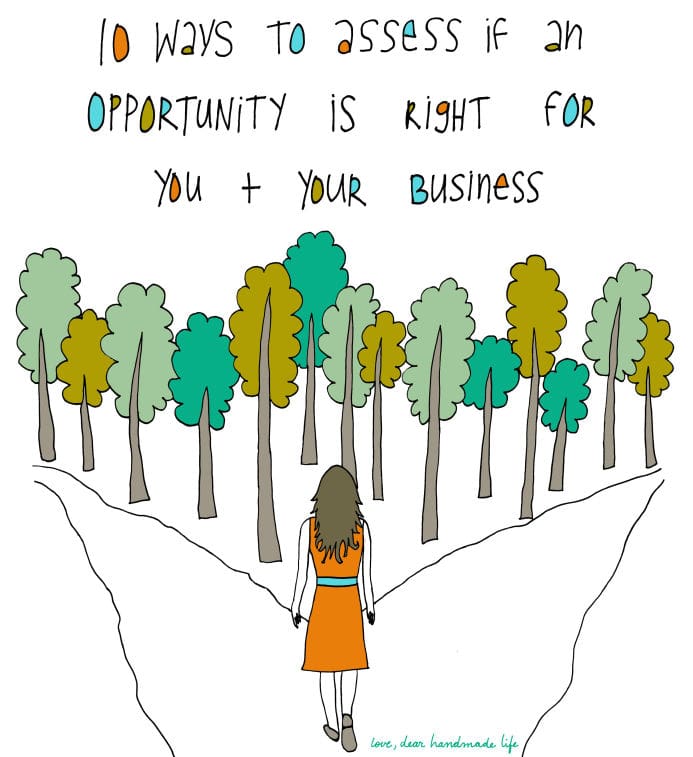10 WAYS TO ASSESS IF AN OPPORTUNITY IS RIGHT FOR YOU + YOUR BUSINESS
“I’m pretty sure my eyeball is about to fall out,” my husband said last week. It was our day off and we were shuttling between Costco, the grocery store and the hardware shop, prepping up for the week, like real grown-ups. Reason number 1,000 of how I know I’m deeply embedded in middle age… I actually enjoy stocking up on toilet paper and laundry soap in bulk and feel great about having a surplus of light bulbs (just in case). My husband said his eye had been twitching since he woke up in the morning and therefore he was pretty sure it was about to fall out.
“Are you stressed out?” I asked.
“No. I’m totally relaxed. It’s our day off!” he answered.
Then I did some deeper probing and he starting talking about several projects he had in the works. His worries about the wine he was making, a big catering job and some other stuff starting pouring out. I told him that all those concerns were much more likely to be the culprit of the eye twitches than something more ominous.
When I was young, I thought I was the only one who was plagued by physical manifestations of mental anxiety. I’m the queen of eye twitches, migraines, rashes, stomach aches and back pain. I’ve also had a laundry list of other stress-related physical issues. It took me a long time to fully realize that often these physical problems were a sign that something was off balance in my personal or work life. Now I pay attention to these signs and heed their call to take a deep look at what’s happening in my life.
Like many creative entrepreneurs, I tend to push myself to the limit. Kari Chapin, my friend and part-time guru says that, “self-employed people are often the worst bosses.” Kari couldn’t be more right. If my boss treated me the way I treat myself, I would have quit years ago.
This past year I took this sentiment to heart and started trying to make the boss part of myself treat the employee part of myself with a little more care and respect. I implemented some changes into my work life to allow a bit more time for my personal life and projects. It’s been hard and even a year later, it’s still a work in progress.
There’s only so much time in a day, week, month and year and the more successful your business is, the more opportunities you have. Established businesses aren’t the only ones that have to make tough choices. Even when I started my first business, I had to make decisions about the best places to invest my time and effort.
Whether it’s picking out which craft fairs to apply for, which new products to add to your line, how to spend your time on social media or which employee to hire, you need to evaluate every choice you make and make sure that it’s right for you and your business.
I’m not the first person to say that you have to know when to say no and I certainly won’t be the last. It’s also important to know when to say yes. If we say yes to too many things or say no and miss out on a once-in-a-lifetime chance, often our bodies send us signs.
Deciding which opportunities you want to pursue isn’t a guessing game. It requires some serious evaluation and analyzing your reaction to the offer. How can creative entrepreneurs who are likely short on time do this effectively?
1. Follow your gut
When you find out about the opportunity does it excite you? Do you get that tingly feeling you get when something exciting is about to happen? Be aware of your first instinct.
2. Distinguish between excitement and anxiety
Excitement can often feel similar to anxiety. Think about falling love: your heart races, your palms sweat, your mind races… because you are excited. Those same things can happen when you feel anxious. Pay close attention to the root of your feelings and decide if they are embedded in anxiety or excitement.
3. Assess learning possibilities + the reward
Some opportunities may present several difficult problems that you have to solve. However they may also mean new connections in a group of people you wouldn’t otherwise have access to, or a chance to build your skill-set. Ask yourself if what you’ll learn from saying yes is worth the price of what you’ll have to do to follow through.
4. Pay attention to your body
Often our bodies serve as a litmus test, letting us know what seems/feels right or wrong. If the opportunity or saying yes or no to it manifests in physical symptoms, it may be time to reevaluate the situation. Migraines and sleepless nights are rarely worth it, although sometimes they are.
5. Assess the pros and cons
Sit down and spend some time accurately writing down the pros and cons of the opportunity. If one side is longer than the other, don’t make your decision just yet. Take some time and assess the value of each pro and con. Sometimes a shorter list actually provides more value than a longer one.
6. Weigh your feelings. How would you feel if you said yes or if you said no?
It’s time for a little creative visualization! Sit down in a quiet room and deeply imagine the consequences of a yes or no decision.
7. Is there a way to adjust to opportunity so that you feel great about signing on?
There may be one aspect of the opportunity that you’re not totally comfortable with. Perhaps there’s a way to adjust the contract or situation to change this aspect so you feel 100% great about it. Reevaluating existing contracts or opportunities may feel scary but it’s totally okay! It may not feel like an option but vendors at craft shows cancel, venues accidentally overbook and people renegotiate contracts all the time!
8. Don’t let fear get you down
It’s not easy to ask for you want, whether you’re in a restaurant asking for an adjustment on a dish when it clearly states ‘no substitutions’ on the menu or you’re asking for more money or extra time for a project. BUT, how can you get what you want if you don’t ask for it? Take the leap and think big. All they can say is no!
9. Get specific details
It’s a huge bummer to sign up for an opportunity and then find out it’s not all that it seemed to be. Don’t be afraid to ask a lot of questions. Getting the details up front will be a big help in the long run.
10. Research
Reach out to other people who’ve done something similar or who have worked with the entity you’re thinking about signing on with. Ask your peers about their experience with the brand. If you don’t know anyone who’s been in a similar situation, reach out on social media.
To avoid ending up with a twitching eye or something worse, take some time out and evaluate the opportunity. It’s easy to get swayed by big names and big talk, but if the opportunity isn’t a good fit and you don’t feel confident about it, it may not be worth it. None of the people that are encouraging you to say yes or no will have to do the work that you’ll have to do to see the opportunity through. In the end, the most important thing is that you feel great about signing on. To quote my dad, quoting Ricky Nelson, “You can’t please everyone, so you have to please yourself.”
-Nicole S.




you know you like to do something when you do it all the time.